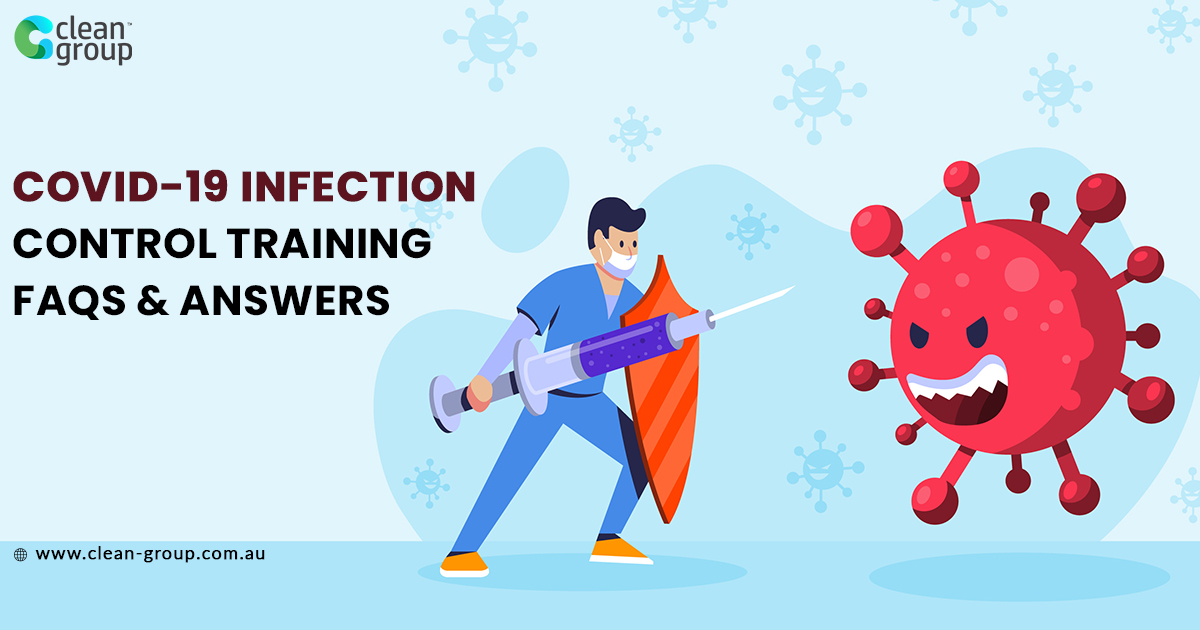Cleaning was never a straightforward job, and now during the time of a pandemic, the role of cleaning and cleaners gets bigger. Precaution is the best defence against Covid-19, but before taking all the precautions properly, people should know the best way to take them. By observing this, many private companies and government authorities have launched Covid-19 training programs and courses, especially for cleaners and health workers.
These training programs and courses are good for making cleaners aware of the situation and provide them training for taking precautions but even after that, there are some important questions cleaners ask during covid-19 training. Here, in this article, we listed all those questions about Covid-19 cleaning services and tried to provide convincing answers to all of them.
What is Covid-19?
COVID-19 is a disease caused by a new virus SARS-CoV-2 which belongs to the coronavirus family. The WHO first noted this new virus on December 31st, 2019 when a cluster of cases of ‘viral pneumonia’ was reported in Wuhan, People’s Republic of China.
Later, some genetic variants of the virus have been found around the world. And it is expected that more variants and waves will appear soon.
What Are the Symptoms of Covid-19?
The most common symptoms of COVID-19 are:
- Fever
- Dry cough
- Fatigue
Symptoms of severe COVID‐19 disease include:
- loss of appetite,
- Temperature above 38 °C.
- Shortness of breath,
- Confusion,
- Persistent pain or pressure in the chest,
Other less common symptoms that may affect some patients include:
- Conjunctivitis or red eyes
- Loss of taste or smell,
- Chills or dizziness.
- Sore throat,
- Nasal congestion,
- Headache,
- Pain in muscle or joint
- Skin rashes,
- Vomiting or nausea,
- Diarrhea,
Other symptoms are:
- Irritability,
- Confusion,
- Reduced consciousness
- Anxiety,
- Depression,
- Sleep disorders,
- Rare neurological complications: strokes, delirium, brain inflammation, and nerve damage.
What Happens When Someone Gets Covid-19?
Of those who get Covid-19, about 80% recover from the disease without any hospital treatment. About 15% become seriously ill and need treatments and oxygen and 5% become critically ill and require intensive care.
Covid-19 can in some serious cases lead to death because of complications including respiratory failure, sepsis and septic shock, acute respiratory distress syndrome (ARDS), thromboembolism, multiorgan failure, and injury to the heart, lungs, liver, or even kidney.
In some rare cases, it has been observed that children can also develop a severe inflammatory syndrome within a few weeks of getting Covid-19.
Who Is Most at Risk of Serious Illness from Covid-19?
People aged 60 years and above having medical problems such as diabetes, high blood pressure, obesity, heart and lung problems, or cancer are at higher risk of developing severe illness from Covid-19. However, anyone at any age can get infected and become seriously ill or die at any age.
What Are the Long-Term Effects of Covid-19?
Not all, but some people who have had COVID-19, whether or not requiring hospitalization, continue to experience some symptoms of the effects of Covid-19. In most of them, common symptoms they were facing are fatigue, and respiratory and neurological symptoms.
What Is the Best Way to Protect Ourselves and Others If We Don’t Know Who Is Infected?
Taking precautions is the best protection against Covid-19. Stay safe by carefully taking all the precautions as shown in the training. These precautions include maintaining distance, wearing a mask, wearing gloves, avoiding crowds and close contact, using hand sanitiser, etc.
As a COVID cleaner, you can protect your customers and yourself by wearing PPE kits and using quality sanitisers and disinfectants during cleaning.
When Should I Get Tested for Covid-19?
If someone is having symptoms, they need to be tested as soon as possible. People who do not have symptoms but have had close contact with an infected or maybe an infected person also need to consider testing for COVID-19. As a cleaner, if you get to know that someone from your previous custom gets infected, you should visit a health centre for testing.
What Are the Recommended Tests to See If I Have Covid-19?
A molecular test is used to detect SARS-CoV-2 and confirm infection, the most common molecular test being the polymerase chain reaction (PCR).
What Are Rapid Antigen Tests?
Rapid Antigen Tests or Rapid Diagnostic Tests (RDTs) detect viral proteins (antigens). It is cheaper but less accurate than PCR. However, it provides more rapid results. It is best when more viruses are spreading in the community.
Is There Any Way to Find Out If Someone Has Covid-19 in the Past?
Yes, Antibody tests can tell if someone has had an infection in the past, however it is not for diagnosing COVID-19. It detects when antibodies start to develop in response to a virus.
What Is the Difference Between Isolation and Quarantine?
Isolation is for Covid-19 positive people or people who have symptoms. Being in isolation means being isolated from everyone in a medical facility (even at home too) where you can receive medical care for at least 10+3 (without symptoms) days.
Whereas, Quarantine is for people who came into contact with someone having Covid-19. In the case of Covid-19 quarantine of at least 14 days is advised.
What Should I Do If I Have Come into Contact with Someone Who Has Covid-19?
If you have been exposed to someone with COVID-19, you can become infected, even if you feel well. Thus, start taking all the precautions very strictly to keep others safe. Contact the health care provider or someone on the COVID-19 hotline.
Corporate the health care experts and follow the advice given by them. Monitor your health and visit a health care centre for proper testing if any of the symptoms are observed. Stay positive and do exercise and meditation.
How Long Does It Take for Symptoms to Develop?
It takes 1-14 days after exposure to Covid-19 for symptoms to develop. However, on average, symptoms of Covid-19 start to appear between 5-6 days.
Is There a Vaccine for Covid-19?
At least 13 different vaccines (in 4 platforms) have been administered.
Some popular ones are:
- Pfizer/BioNTech Comirnaty vaccine
- SII/Covishield
- AstraZeneca/AZD1222 vaccines
- Janssen/Ad26.COV 2.S
- Moderna COVID-19 vaccine (mRNA 1273)
- Sinopharm COVID-19 vaccine
What Will I Have to Do If I Get Symptoms of Covid-19?
If you have symptoms of Covid-19, the first thing you should do is to call your healthcare provider for instruction. Also, find out how and when you can get tested for Covid-19. Take all precautions and stay away from others for at least 14 days and monitor your health.
Is There Any Cure for Covid-19?
The WHO does not recommend self-medication with any drug, and scientists are also trying to find an effective cure to treat Coronavirus.
Meanwhile, oxygen is included in optimal supportive care for critically ill/at-risk patients. Additionally, dexamethasone, a corticosteroid, may help reduce the length of time on a ventilator and save the lives of patients with severe diseases.
Are Antibiotics Effective in Preventing or Treating Covid-19?
Antibiotics are for bacterial infection and not for viruses, thus antibiotics are not effective against Covid-19. However, hospitals can use it to prevent/treat secondary bacterial infections. Which appears as a complication of Covid-19.
These answers will not only help cleaners to get accurate information, but it will also help them to answer the question of customers. Cleaning is a tough job and cleaners have to be proactive to follow all the guidelines and precautions.
However, If you are looking for a professional cleaning company for cleaning, certification, and training, Clean Group is here for you.
Clean Group is one of the highly reputed cleaning companies located in Sydney, NSW, Australia. The company is actively providing quality commercial cleaning services too, industrial, and strata buildings.
We have all the resources like tools, cleaning/sanitizing/disinfecting solutions, equipment, machines and a team of responsible and experienced cleaners. Thus, don’t wander here and there and contact Clean Group now for all your cleaning needs.

